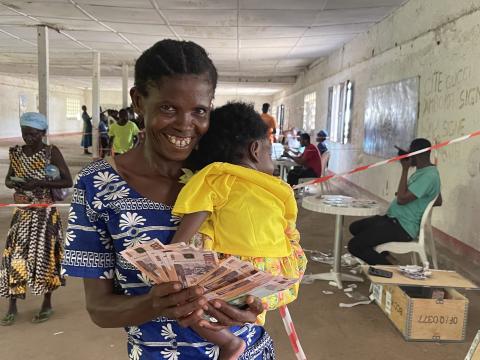DR Congo: Cash And Food To Support Vulnerable Households Displaced In Kwango

By Didier Nagifi, Communications officer
In the Kwango province of the Democratic Republic of Congo, food insecurity and forced displacement are weakening communities. In response to this crisis, World Vision DRC, in partnership with the World Food Programme (WFP), has launched an emergency initiative to assist vulnerable households in Batshongo, Pont Kwango, Bukanga Lonzo, and Kenge.
Concrete Support for Over 80,000 Beneficiaries
The goal of the project is to improve food security and the nutritional status of 80,247 vulnerable people in the provinces of Kwango, Kwilu, and Mai N'Dombe by March 2025. The assistance includes:
• Cash transfers: $4,755,780 to be distributed to 52,842 people
• Food distribution: 1,567.531 tons of food for 15,691 people
• Total tonnage: 1,865.14 tons of food
• Total project value: $9,054,563.
Among the beneficiaries, women share the impact of this aid.
Olga, a mother of nine children, shares her story: "Fleeing the conflict, we endured hunger and the lack of school for our children. Returning to our village, we found our home in ruins. Thanks to WFP and World Vision, I received 540,000 Congolese francs (192Usd), which allowed me to renovate our house, pay for my children's education, and start an income-generating activity. We also received corn and soy flour to feed our children. This aid has transformed our lives."
Belinda, a widow and mother of three children, also shares her experience:
"We fled the conflict and suffered greatly. My husband passed away, leaving my children and me without resources. The aid from WFP and World Vision allowed me to buy mattresses, pay for my children's education, and invest in an economic activity to ensure their survival."
By providing food and financial assistance to vulnerable populations, World Vision and WFP strengthen communities' resilience to crises. This project highlights the importance of coordinated humanitarian action to offer a better future for families most affected by food insecurity.